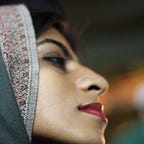Adrienne Rich’s Love Poems
There are many, many things that Adrienne Rich wrote during her brilliant career that will always be very important to me. I say this with conviction because the way I feel about them has remained unchanged for many years — they evoke the same sharp wonder in me every time I revisit them, as I do often.
But the poems I return to the most — that I seem to need the most — are her ‘Twenty One Love Poems’. They are not only or even primarily love poems — like any great poetry, they are so much more.
I love them so fiercely that it is difficult for me to write about them without resorting to adjective-laden, overwrought praise. These are poems of honesty, tremendous integrity. They are deeply political. They are deeply lyrical. On nights that not much else makes sense, I read them to remind myself that such beauty is possible:
‘No one has imagined us. We want to live like trees,
sycamores blazing through the sulfuric air,
dappled with scars, still exuberantly budding,
our animal passion rooted in the city.’
(I)
‘I let myself into the kitchen, unload my bundles,
make coffee, open the window, put on Nina Simone
singing Here comes the sun. . . . I open the mail,
drinking delicious coffee, delicious music,
my body still both light and heavy with you. The mail
lets fall a Xerox of something written by a man
aged 27, a hostage, tortured in prison:
My genitals have been the object of such a sadistic display
they keep me constantly awake with the pain . . .
Do whatever you can to survive.
You know, I think men love wars . . .
And my incurable anger, my unmendable wounds
break open further with tears, I am crying helplessly,
and they still control the world, and you are not in my arms.’
(IV)
‘…centuries of books unwritten piled behind these shelves;
and we still have to stare into absence
of men who would not, women who could not, speak
to our life — this still unexcavated hole
called civilization, this act of translation, this half-world.’
(V)
‘What kind of beast would turn its life into words?
What atonement is this all about?
— and yet, writing words like these, I’m also living.
Is all this close to the wolverines’ howled signals,
that modulated cantata of the wild?
or, when away from you I try to create you in words,
am I simply using you, like a river or a war?
And how have I used rivers, how have I used wars
to escape writing of the worst thing of all —
not the crimes of others, not even our own death,
but the failure to want our own freedom passionately enough
so that blighted elms, sick rivers, massacres would seem
mere emblems of that desecration of ourselves?’
(VI)
‘Well, that’s finished. The woman who cherished
her suffering is dead. I am her descendant.
I love the scar-tissue she handed on to me,
but I want to go on from here with you
fighting the temptation to make a career of pain.’
(VII)
‘But we have different voices, even in sleep,
and our bodies, so alike, are yet so different
and the past echoing through our bloodstreams
is freighted with different language, different meanings —
though in any chronicle of the world we share
it could be written with new meaning
we were two lovers of one gender,
we were two women of one generation.’
(XII)
When Adrienne’s partner, the author Michelle Cliff passed away earlier this year, I sat with this poem for a long time:
‘Since we’re not young, weeks have to do time
for years of missing each other. Yet only this odd warp
in time tells me we’re not young.
Did I ever walk the morning streets at twenty,
my limbs streaming with a purer joy?
did I lean from my window over the city
listening for the future
as I listen with nerves tuned for your ring?
And you, you move towards me with the same tempo.
Your eyes are everlasting, the green spark
of the blue-eyed grass of early summer
the green-blue wild cress washed by the spring.
At twenty, yes: we thought we’d live forever.
At forty-five, I want to know even our limits.
I touch you knowing we weren’t born tomorrow,
and somehow, each of us will help the other live,
and somewhere, each of us must help the other die.’
(III)
You can read them all here.
